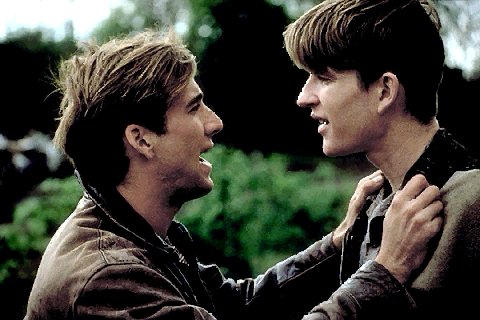Rainbow
with Egg
Underneath and an Elephant

Birdy
BIRDY
by DAVID E. WHILLOCK
VIETNAM WAR FILMS:Edited by Jean-Jacques Malo and Tony Williams
McFarland & Company, Inc., Publishers
(Jefferson, North Carolina, and London)
1994
Birdy
1985, USA. Tri-Star. Color. 120 mins.
Director: Alan Parker; Producer: Alan Marshall; Screenplay: Sandy Kroopf and Jack Behr, based on the novel by William Wharton; Director of Photography: Michael Seresin; Editor: Gerry Hambling; Music: Peter Gabriel: Cast: Matthew Modine (Birdy), Nicolas Cage (Al Columbato). John Harkins (Dr. Weiss), Sandy Baron (Mr. Columbato), George Buck (Birdy's Father), Dolores Sage (Birdy's Mother), Maude Winchester (Doris Robinson).
Themes and key words: Impact of war on combat soldiers; veterans coming home from the war; V.A. hospitals; loss of innocence; W.I.A.; flashbacks.
Synopsis: Birdy is a Vietnam casualty. He has been superficially wounded in a helicopter wreck. but remains mentally catatonic. His childhood friend, Al, who is also a Vietnam casualty, leaves the hospital at Fort Dix to visit Birdy. The intent of the visit is to bring Birdy out of his self induced mental state. Al was injured in an attempt to help a wounded soldier in Vietnam. Shrapnel destroyed his right cheek.
The story is told in flashbacks. Birdy is an introverted high school student who is obsessed with birds. He befriends Al, who is obsessed with sex and they basically come to understand one another through specific events in their coming of age. They try to develop a business in homing pigeons, but Birdy's mother destroys this business. They successfully rebuild an old car. They drive the car to Atlantic City, New Jersey, and are picked up by the police for car theft. Al's father reported the car stolen. Al attempts to give pointers to Birdy dealing with the opposite sex, but his words fall upon deaf ears. Birdy's fantasy is to fly. Sex doesn't interest him. The older Birdy gets the more introverted he becomes. After high school Al enlists in the army and Birdy is drafted. In Vietnam they both become casualties of war. At the mental hospital, Al tries to bring Birdy out of his coma by recreating the moments of their high school days. Throughout his attempt to bring Birdy back, Al is confronted with his own self-doubts and weaknesses. We find that he is abusive to authority figures (possibly because of his father's own abusive actions) and that his ability mentally put the war and his own disfigurement behind him relates directly to bringing Birdy back into reality. Eventually he is successful.
Comments: Birdy attempts to investigate several issues. They include the internal and external wounds of the war, the loss of innocence of America's youth because of their experience in war, and the treatment of Vietnam veterans at home after the war.
This film is mostly about the casualties of war: how war affects those who fight it, and how those effects can be devastating to the veteran's life. What the film does best is to explore how the psychological wounds of war are far more devastating than the physical wounds. With Birdy the catatonic depression is a form of escape from the horrors of war. Birdy simply was a child where fantasy and reality merged. He was ripped from that childhood by Vietnam and thrown into its impossible reality Birdy could not cope so he spiraled into an internal fantasy that was initially never far from the surface. Al is the true casualty of Vietnam. His enlistment was a logical step out of the white ghetto of his Philadelphia home. His father was a garbage man, his mother an abused housewife. Al had no real future and the military's need for numbers placed him at their mercy.
Birdy doesn't directly discuss the impact of the war on these two individuals until the end of the film. It is here that Al in his effort to bring Birdy out of his coma discusses how they, the veterans of an unpopular war, were the losers and how their expectations were driven by John Wayne fantasies. His frantic attempt to bring Birdy out summarizes the symbolism of the film. He tells Birdy that 'they [the Army, got the best of us ... we haven't anything to do with making our own lives ... I feel like one of those dogs that nobody wanted." The film succeeds in discussing the effects of combat. The moral lesson of the film is in the way the veteran was treated once the shooting stopped. However, the film has no "quick fix" answers to the problems brought home from the war by veterans who were mental and physical casualties of war.